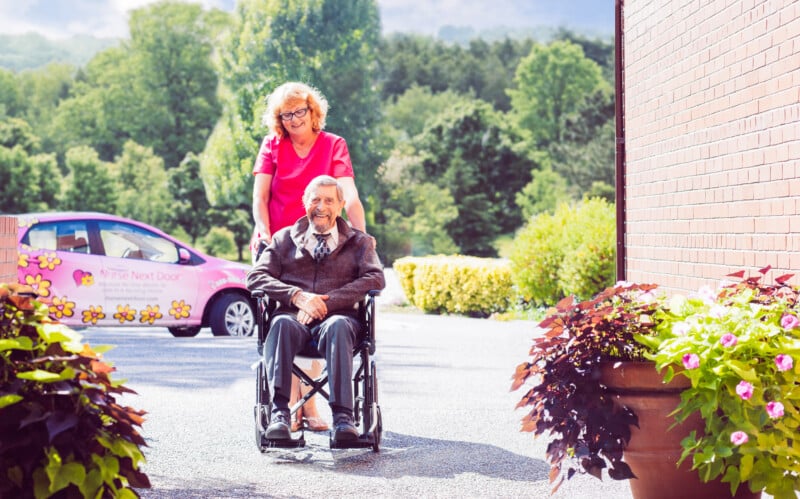You want to offer a service that allows seniors to stay in homes they love as they age. According to the University of Michigan National Poll on Healthy Aging, 88% of older adults aged 50-80 want to remain in their homes for as long as possible.
Private home caregivers support older adults in maintaining their independence and lifestyle. Private duty home care services are often customizable and allow clients to live on their terms while having their needs met.
What is Private Duty Home Care?
Private duty home care is an in-home care service that allows individuals, particularly the elderly, to maintain their independence and stay at home. These services are often customizable, allowing clients to tailor services to their specific needs and preferences.
While community care services are great for fending off loneliness and helping loved ones remain active, they are relatively strict. Spots are limited, waitlists are often months long, and they might not even offer the care the client requires.
In the private pay model, clients or their families directly cover the costs, allowing them to tailor services like personal care, meal preparation, and companion care services. This means clients can get the quality care they need without the obstacles and delays seen in traditional services like Medicare and Medicaid.
Medicare Home Health Care
Medicare and Medicaid-funded home care generally involve more stringent eligibility requirements and limit the types of home health services available, like wound care or physical therapy. While these programs may cover some home health aide services, they often do not fund personal care services like bathing or meal preparation. They are also unlikely to cover additional services like companion care or social interaction that many seniors and their families find invaluable for overall well-being.
What Are The Most Common Home Care Services?
Private duty care services cover a wide range of offerings, from personal care to homemaker services. Many families appreciate additional services like companionship or assistance with daily living activities beyond medical care. Unlike Medicare or Medicaid, private pay allows for a broader range of services, including nonmedical home care.
The most common home care service is personal care assistance, but here is a complete list of the most common home care services and what it usually includes:
- Personal Care Assistance: Bathing, grooming, hygiene care, mobility assistance, toileting, and incontinence care.
- Homemaker Services: Grocery shopping, meal prep, and light housekeeping
- Companionship Services: Social interaction, recreational activities, appointments and social events
- Skilled Nursing Care: Medication management, wound care, chronic disease management, and post-surgical care
- Therapy Services: Physical, occupational, and speech therapy
- Respite Care: Short-term care to support primary caregivers
- Palliative and Hospice Care: End-of-life care, including symptom relief and emotional support
- Specialized Care: Specialized services for specific conditions, including Alzheimers, Dementia, and Parkinson
What is The Difference Between Private Duty Nursing and Home Health Care?
While both private duty care and home health care offer primary care to clients, there are key differences to the services they offer. From payment options to types of care, here are the differences and similarities between the two services:
- Private Duty Nursing (PDN)
- One-on-one medical care by a licensed professional (RNs/LPNs). This includes complex medical needs like ventilator care, tracheostomy care, G-tube care, and medication administration.
- Long-term and continuous care, potentially 24/7. Tailored for individuals requiring extensive and regular medical care at home.
- May include personal care and homemaking services
- Typically paid through private funds, long-term care insurance, or Medicaid. Less likely to be covered by Medicare unless specific conditions are met.
- Home Health Care
- Medical and therapeutic care by a team of healthcare professionals. It includes recovery and rehabilitation services like wound care, IV therapy, physical therapy, and health condition monitoring.
- Short-term and intermittent care for a few hours per week. Aimed at patients recovering from illness, surgery, or hospitalization.
- Usually, it does not include personal care and homemaking services unless eligible.
- Often covered by Medicare, Medicaid, and private insurance when prescribed by a doctor. Subject to specific eligibility criteria and often includes time-limited services.
Benefits Of Owning a Private Duty Home Care Business
1. High Growth Potential
The US Census Bureau estimates the population aged 65 and over will reach more than 80 million by 2025. With a strong preference for aging at home, the demand for home care services is high. This ensures consistent demand and opportunities for growing your business.
2. Profitable and Scalable
A benefit to starting a home care business is the lower start-up cost compared to other industries. Home care businesses are flexible in how you choose to run them, which gives you more control over the start-up costs. An example is running the company out of your home when you first start, which will save you money on rent.
The growing demand for in-home care means there’s a good chance your business will grow quickly, and you can turn a profit sooner than you think. Eventually, you can scale your business to expand your offerings and improve your services.
3. Positive Community Impact
Starting a home care business not only serves those in need of care but also supports primary caregivers. You also create new jobs and contribute to the local economy by starting a private home care business.
Many families require respite care to help relieve primary caregivers and allow them to continue supporting their loved ones without burning out. Your services can improve the quality of life of seniors and disabled individuals and support their mental and emotional health.
Start a Home Health Care Franchise with Nurse Next Door
Help seniors stay at home with Nurse Next Door. We are a home healthcare company dedicated to providing a Happier Aging™ experience to all our clients. We offer unmatched training and support for our franchisees so they can focus on making a difference in their communities.
From our bold pink brand to our 24/7 centralized call center, you’ll stand out as a Nurse Next Door Franchisee in the home care market. As a franchisee, you’ll have access to our established business model, comprehensive training and support, and a network of other franchise owners who can offer advice specific to your business.
Still unsure about starting a franchise with us? Talk to an expert and start your home healthcare business today!
Let’s change healthcare together, making life better for patients at home, one step at a time.

 x
x




